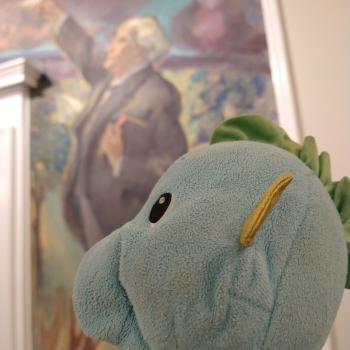Read more about the conference here:
1. Doctors and other medical professionals can actually be very friendly. While that hasn’t always been my experience in the exam room, let alone other people’s, everyone here has been extremely gracious and introduced themselves to all and sundry (including me, the “one of these things is not like the other” journalist). Everyone I’ve met seems to have a genuine concern for patients and a desire to help them (including by not backing up the waiting room sharing the gospel.)
2. The Bible refuses to reduce suffering and sickness to a single cause, but deals with it in all its physical, spiritual, and social complexity. As one of my friends attending the conference noted, we are “bio-physical-spiritual-social beings.” (Try saying that 5 times fast.)
3. There is a sizable amount of research backing up the fact that religion and spirituality play an important role in health care and that medical professionals ignore this at patients’ peril. I have believed this ever since I read Larry Dossey’s Healing Words 20 years ago, but apparently quite a lot more studies back it up since.
4. Most Christian doctors do not actually seem like the tract-sharing type (whew!). Repeatedly attendees noted that while they may have been made to feel guilty about not handing out tracts they actually prefer the more nuanced and sensitive approach that Grace Prescriptions encourages.
5. Taking a “spiritual history” is actually required for patients in some health settings like nursing homes and home health care. While many people at the conference say it is in danger of being just another box to check off, it has recently become a requirement and can be an opening to discussing issues of faith.
6. Taking a spiritual history with sensitivity is actually quite hard to do well (we role-played doing this) but all the same I actually think I would like to be able to discuss the role faith plays in my life with my doctor if I was facing something serious. (Not sure I need my dentist to do it every time I get a filling.)
7. There is a whole spectrum of “spiritual interventions” a medical professional might consider. These range all the way from acknowledging the role of faith up through assessing it, providing referrals to faith communities/pastors/counselors, sharing their own story, and even praying with patients. Sensitivity to where the patient is should be paramount.
8. Conversion is a process/journey not simply (or not always) an event. As a good mainliner this is something I already believe, but it was acknowledged in thoughtful ways today–along with a great discussion of the various barriers to faith in people’s lives (emotional, intellectual, volitional, and social).
9. People will say things to their doctor they will never say to their pastor. (Or to the hospital chaplai n.)
n.)
Finally, 10. Doctors eat just as much chocolate at breaks as everybody else. Physician, heal thyself. 🙂














